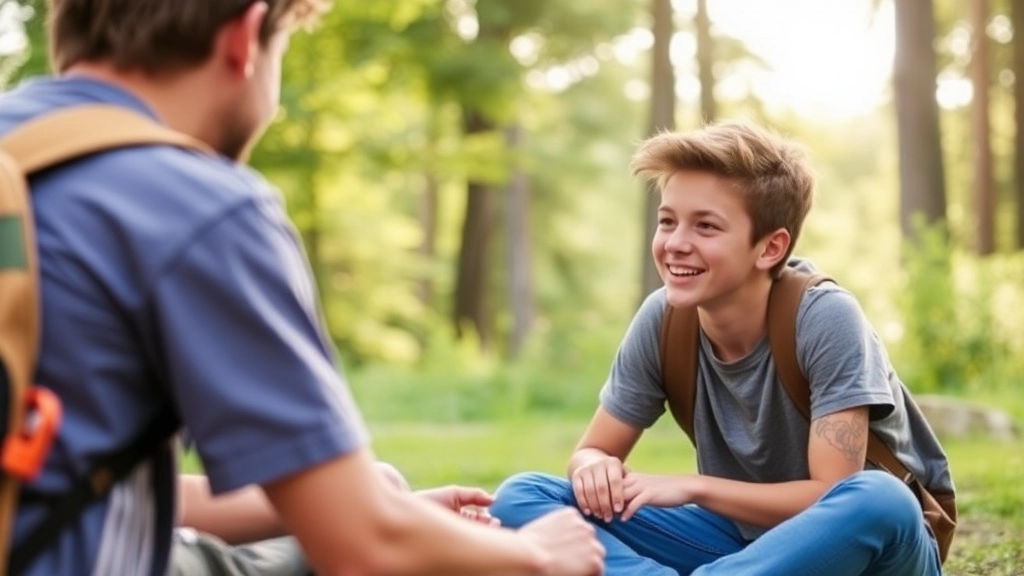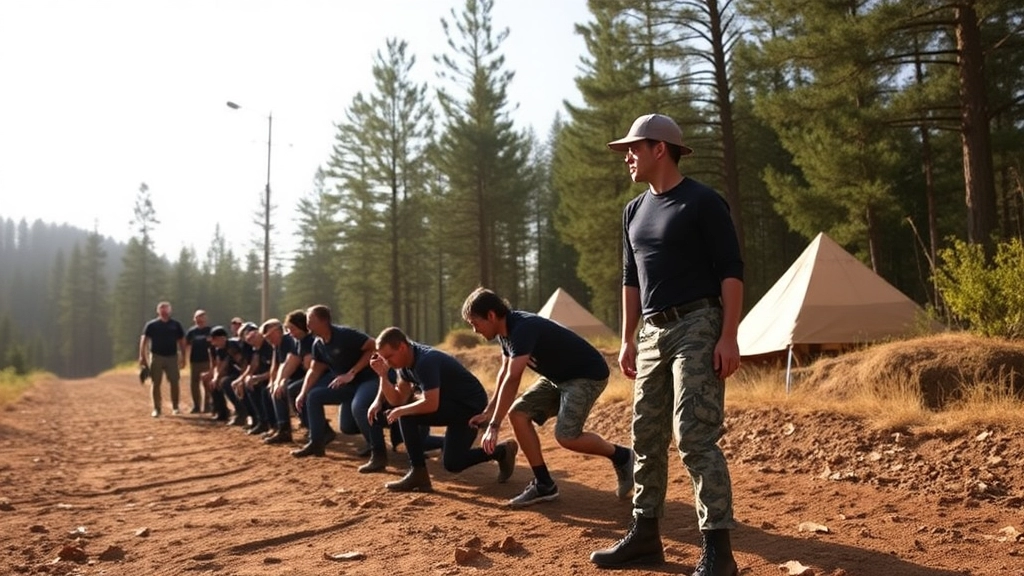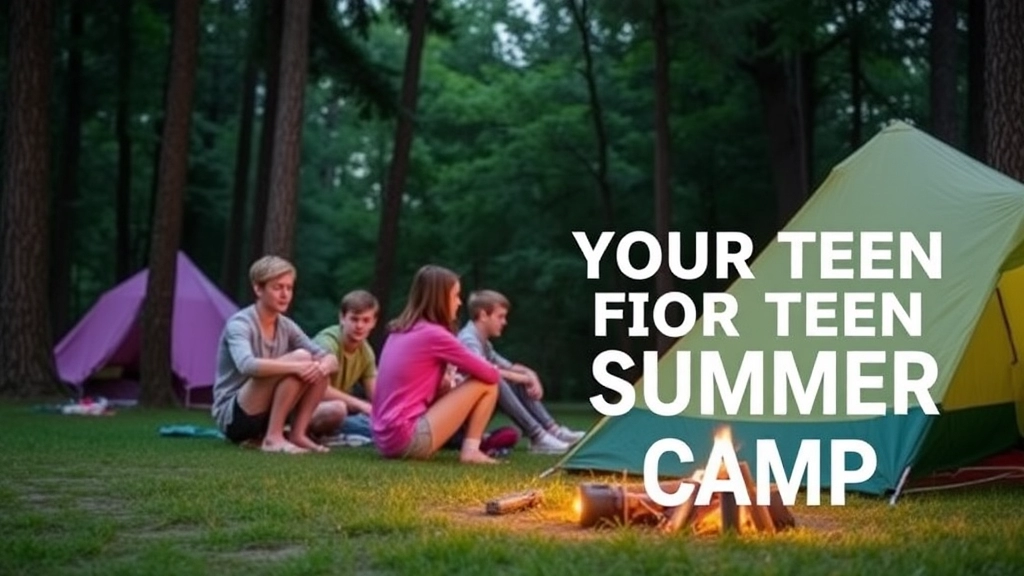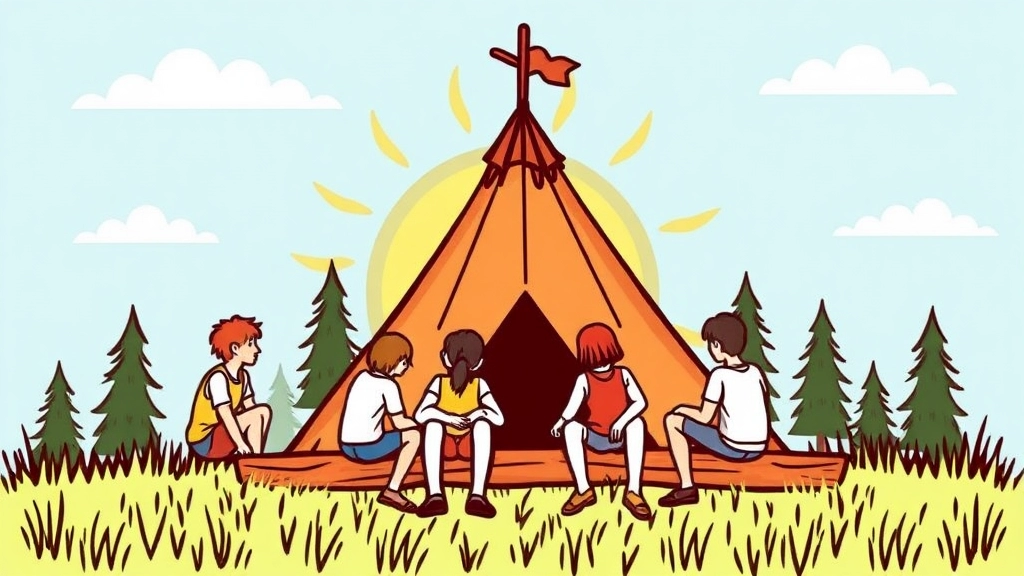Welcome to Our Comprehensive Guide
Welcome to our comprehensive guide on navigating the complex world of summer camps for troubled teens. As a parent, you may find yourself overwhelmed by the variety of options and the stakes involved in making the right choice. This article aims to demystify the process, offering insights into different types of camps, how to choose the right one, and the benefits and risks associated with each. Whether you’re considering wilderness therapy, therapeutic boarding schools, or even boot camps, we’ve got you covered.
Our Journey
Our journey will take you through the therapeutic activities and programs offered at these camps, how to prepare your teen for their time away, and the importance of post-camp support for long-term success. We’ll also address common questions and concerns, providing you with the tools to make an informed decision. So, if you’re ready to explore the transformative potential of a summer camp for troubled teens, read on to discover how to turn a challenging situation into a growth opportunity for your child.
Types of Summer Camps for Troubled Teens
Alright, let’s dive straight into it. If you’re a parent dealing with a troubled teen, you’re probably asking yourself: “What kind of summer camp can actually help my kid?” It’s a valid question, and you’re not alone. I’ve been there, and I get it. So, let’s break it down.
Wilderness Therapy Camps
These camps are all about getting back to nature. Your teen will spend time hiking, camping, and learning survival skills. The idea is that being in the great outdoors can help them reset and gain a new perspective.
- Pros: Builds self-reliance, promotes teamwork, and provides a break from technology.
- Cons: Can be physically demanding and may not suit everyone.
Therapeutic Boarding Schools
These are more structured environments where your teen will live and learn for a set period. They combine academics with therapy, aiming to address both educational and emotional needs.
- Pros: Continuous support, academic progression, and structured environment.
- Cons: Longer commitment, higher cost.
Boot Camps
Think of these as the “tough love” option. They focus on discipline and structure, often using military-style routines.
- Pros: Instills discipline, can be a wake-up call.
- Cons: Can be harsh, controversial effectiveness.
Adventure Camps
These camps offer activities like rock climbing, kayaking, and other adrenaline-pumping adventures. They aim to build confidence and teach problem-solving skills.
- Pros: Fun and engaging, builds confidence.
- Cons: Less focus on therapy, more on activities.
Specialty Camps
These camps target specific issues like substance abuse, eating disorders, or behavioural problems. They offer tailored programs to address these specific needs.
- Pros: Highly focused, specialised care.
- Cons: May not address broader issues.
Faith-Based Camps
For those who find strength in spirituality, these camps incorporate religious teachings with therapeutic activities.
- Pros: Spiritual support, community feeling.
- Cons: May not be suitable for everyone.
Internal Linking Opportunities
If you’re interested in how to choose the right camp for your teen, check out our next section: 2024 Summer Camp Guide: Types, Benefits & Tips. For more on the benefits of wilderness therapy, read: Seattle Summer Camps: Fun for All Ages.
How to Choose the Right Camp for Your Teen

Choosing the right camp for your troubled teen can feel like navigating a minefield.
You’re probably asking yourself:
- How do I know which camp is legit?
- Will my teen actually benefit from this?
- What if it makes things worse?
These are real worries, and you’re not alone.
Start with Research
First things first, do your homework.
You want to look for camps with solid reputations.
Check online reviews, ask for recommendations, and dig into their websites.
Look for accreditation from reputable organisations.
Know Your Options
Different camps offer different vibes.
Here are some types to consider:
- Wilderness Therapy Programs: These are great for teens who need to reconnect with nature and themselves.
- Therapeutic Boarding Schools: They combine academics with therapy.
- Boot Camps: These are more intense and focus on discipline.
Match the Camp to Your Teen
Every teen is unique.
Here’s how to make sure the camp fits your teen:
- Assess Their Needs: Is your teen dealing with substance abuse, behavioural issues, or emotional struggles?
- Consider Their Interests: A camp that aligns with their hobbies can make the experience more engaging.
- Therapeutic Approach: Ensure the camp’s therapeutic methods match what your teen responds to best.
Ask the Right Questions
When you’ve narrowed down your options, it’s time to get specific.
Here are some questions to ask:
- What qualifications do the staff have?
- What’s the staff-to-teen ratio?
- How do they handle emergencies?
- What’s the daily schedule like?
Visit the Camp
If possible, visit the camp.
Seeing it in person can give you a better feel for the environment and the people running it.
Trust Your Gut
At the end of the day, trust your instincts.
If something feels off, it probably is.
Benefits of Wilderness Therapy Programs
Ever wondered if sending your troubled teen to a wilderness therapy program is the right move? You’re not alone. Many parents wrestle with this decision, so let’s dive into the real benefits of these programs. Trust me, you’ll want to stick around for this.
Why Wilderness Therapy?
Wilderness therapy programs have become a popular choice for troubled teens, and for good reason. Here’s why:
- Nature’s Healing Power: There’s something about being in the great outdoors that helps teens reconnect with themselves. Away from the chaos of daily life, they find peace and clarity.
- Building Resilience: These programs push teens out of their comfort zones. They learn to handle challenges head-on, which builds resilience and confidence.
- Teamwork and Social Skills: Teens work together to overcome obstacles. This builds essential social skills and fosters a sense of community.
- Unplugging from Technology: With no screens to distract them, teens are forced to engage with the world around them. This can be a game-changer for their mental health.
Real Stories, Real Impact
Imagine your teen, who’s always glued to their phone, suddenly finding joy in hiking, building shelters, and starting campfires. One parent shared with me how their son, initially resistant, came back from a wilderness therapy program more grounded and self-aware. He even took up gardening!
What to Expect in a Wilderness Therapy Program
Here’s a quick rundown of what these programs typically include:
- Outdoor Activities: Hiking, camping, and survival skills
- Therapeutic Sessions: Group and individual therapy sessions
- Life Skills Training: Cooking, cleaning, and other essential skills
- Mindfulness Practices: Meditation and journaling
Key Benefits Summarised
- Improved Mental Health: Reduced anxiety and depression
- Enhanced Problem-Solving Skills: Learning to tackle real-world problems
- Better Communication: Improved relationships with peers and family
- Increased Self-Esteem: Achieving personal goals boosts confidence
Weighing the Pros and Cons
While wilderness therapy programs offer numerous benefits, it’s essential to weigh the pros and cons. Not every teen will thrive in this environment, so consider your child’s personality and needs.
Preparing for Wilderness Therapy
Before sending your teen off, have an open conversation about what to expect. Pack the right gear, and make sure they’re mentally prepared for the adventure ahead. You might find some useful tips in our Summer Camping Gear Tips and Fun Activities guide.
Post-Therapy Support
The journey doesn’t end when the program does. Ensure your teen has access to ongoing support and therapy to maintain their progress. This could be regular check-ins with a therapist or joining support groups. For additional ideas on how to keep the momentum going, check out our Summer Camp Volunteer Benefits, Tips, and Challenges article.
Risks and Controversies Surrounding Boot Camps

Ever wonder if a boot camp is the right choice for your troubled teen?
Let’s dive into it.
Boot Camps: The Good, the Bad, and the Ugly
Boot camps can be intense.
They’re often seen as a quick fix for behavioural issues.
But are they?
Risks to Consider
Before you sign up, think about these:
- Physical Harm: These camps can be physically demanding. Some teens might not be able to handle the stress.
- Mental Health Impact: The tough-love approach can sometimes do more harm than good. It can lead to anxiety, depression, or worse.
- Lack of Qualified Staff: Not all boot camps have trained professionals. Your teen might not get the help they truly need.
- Short-Term Fix: Sure, boot camps might show quick results. But are they sustainable? Often, the changes don’t last once your teen is back home.
Real Stories, Real Concerns
I’ve heard parents talk about their teens coming back more rebellious than before.
Some even mentioned their kids felt traumatised.
That’s not what you want, right?
Controversies in the Spotlight
The media has highlighted some serious issues with boot camps:
- Abuse Allegations: There have been reports of mistreatment and abuse.
- Unregulated Camps: Not all camps are regulated. This means there’s no guarantee of safety or effectiveness.
- Legal Issues: Some camps have faced lawsuits. That’s a big red flag.
What’s the Alternative?
If you’re worried about these risks, consider other options:
- Wilderness Therapy: Less intense but still effective. It focuses on personal growth and healing.
- Therapeutic Boarding Schools: These provide a structured environment with professional support.
- Counselling and Therapy: Sometimes, one-on-one sessions with a therapist can make a world of difference.
Final Thoughts
Boot camps are not a one-size-fits-all solution.
Weigh the pros and cons carefully.
Your teen’s well-being is the priority.
If you’re still unsure, talk to a professional.
They can guide you to the best option for your teen.
Therapeutic Activities and Programs Offered
Feeling lost about what your teen’s summer camp will actually do for them? You’re not alone. Many parents wonder what kind of activities and programs are in place to help their troubled teens. Let’s dive into the therapeutic activities and programs offered at these camps, so you can get a clear picture.
What Exactly Do These Camps Offer?
First off, these camps aren’t just about sending your teen into the wilderness and hoping for the best. They have structured programs designed to help teens work through their issues. Here’s what you can expect:
- Individual Therapy Sessions
- One-on-one time with a licensed therapist.
- Personalised treatment plans.
- Focus on specific issues like anxiety, depression, or behavioural problems.
- Group Therapy
- Sessions where teens can share experiences and support each other.
- Facilitated by trained professionals.
- Encourages social skills and empathy.
- Family Therapy
- Involves the whole family in the healing process.
- Helps improve communication and resolve underlying family issues.
- Often includes workshops and family weekends.
Wilderness Therapy Programs
Now, let’s talk about one of the most engaging forms of therapy offered: Wilderness Therapy. This isn’t just a walk in the park. It’s a structured program that uses nature to help teens heal. Here’s how it works:
- Outdoor Activities: Hiking, camping, and survival skills. These aren’t just fun; they teach responsibility and teamwork.
- Nature Immersion: Being in nature has a calming effect, reducing stress and anxiety.
- Life Skills Training: Teens learn practical skills like cooking, setting up camp, and navigating trails, boosting their confidence.
Academic Support
Don’t worry; your teen won’t fall behind on their studies. Many camps offer academic support:
- Tutoring Sessions: One-on-one or small group sessions to help with schoolwork.
- Structured Study Time: Ensures teens keep up with their academic responsibilities.
- Specialised Programs: For teens with learning disabilities or other educational needs.
Recreational Activities
You can’t have all work and no play. These camps also include a variety of recreational activities to keep things balanced:
- Sports: Basketball, soccer, swimming, and more.
- Arts and Crafts: Painting, drawing, and other creative outlets.
- Music and Drama: Opportunities to explore talents and build self-esteem.
Life Skills Workshops
These workshops aim to equip teens with essential life skills:
- Conflict Resolution: Learning how to resolve disputes peacefully.
- Time Management: Techniques to manage time effectively.
- Goal Setting: Helping teens set and achieve personal goals.
Real Stories, Real Impact
Let me share a quick story. I met a parent whose teen attended a summer camp for troubled teens. Initially sceptical, they were amazed at the transformation. Their teen, who once struggled with anger and defiance, returned home with a newfound sense of responsibility and a more positive outlook on life. The combination of individual therapy, group sessions, and wilderness activities made a world of difference.
Preparing Your Teen for Summer Camp

Worried about sending your teen to summer camp? You’re not alone.
Parents often stress over whether their troubled teen will adapt, make friends, or even benefit from the experience.
So, how do you set them up for success?
First off, communication is key.
Sit down with your teen and discuss what they can expect.
Be honest about the camp’s purpose and the activities involved.
Set realistic expectations.
Explain that it won’t be a walk in the park but that it’s designed to help them grow.
Pack wisely.
Ensure they have everything they need, from comfortable clothes to any medication they might require.
A checklist can be super handy here.
Get them involved in the preparation.
Let them pick out their gear or pack their own bag.
This gives them a sense of control and responsibility.
Address their concerns.
Is your teen worried about making friends or fitting in?
Share stories of your own experiences or those of others who’ve been in similar situations.
Practice some skills at home.
If the camp involves physical activities like hiking or canoeing, do some prep work together.
It’ll make them feel more confident.
Talk about coping strategies.
Discuss ways they can handle stress or homesickness.
Simple techniques like deep breathing or journaling can make a big difference.
Keep the lines of communication open.
Reassure them that they can write letters or make calls if they feel overwhelmed.
Plan a post-camp debrief.
Let them know you’ll be there to listen and support them once they’re back.
This helps them feel secure about the entire process.
Involve them in the decision-making.
The more they feel part of the process, the more likely they are to engage positively.
Remember, the goal is to make this transition as smooth as possible.
Preparing your teen for summer camp isn’t just about packing bags.
It’s about mental and emotional readiness too.
By following these steps, you’re setting them up for a rewarding experience.
Post-Camp Support and Long-Term Success
So, your teen’s just wrapped up a summer camp. Now what?
How do you keep the progress going?
How do you make sure all that hard work doesn’t go down the drain?
Let’s dive in.
Why Post-Camp Support Matters
First off, let’s get real. The journey doesn’t end when the camp does.
It’s just the beginning.
Your teen’s learned new skills, faced some tough challenges, and maybe even discovered a new side of themselves.
But without the right support, it’s easy to slip back into old habits.
Creating a Supportive Environment
Here’s what you need to do:
- Open Communication: Keep the lines open. Talk about their experiences. Ask questions. Listen.
- Consistent Routine: Structure helps. Stick to a routine that mirrors what they had at camp.
- Professional Guidance: Don’t shy away from therapy or counselling if needed. It’s a game-changer.
- Peer Support: Encourage them to stay in touch with friends they made at camp. Shared experiences build strong bonds.
Setting Realistic Goals
Remember, it’s a marathon, not a sprint.
Set small, achievable goals.
Celebrate the wins, no matter how tiny.
This keeps motivation high and progress steady.
Monitoring Progress
Keep an eye on how things are going.
Are they using the skills they learned?
Are they facing new challenges?
Regular check-ins can help you adjust the support they need.
Long-Term Success Strategies
Want to know the secret sauce for long-term success?
Here it is:
- Continued Learning: Encourage them to keep learning and growing. Books, courses, hobbiesâwhatever keeps their mind engaged.
- Healthy Lifestyle: Diet, exercise, sleep. The basics matter more than you think.
- Positive Reinforcement: Acknowledge their efforts. Positive vibes go a long way.
- Community Involvement: Get them involved in local groups or activities. Being part of a community adds a sense of purpose.
Real-Life Example
I had a mate whose son went through a wilderness therapy program.
When he got back, they didn’t just sit back and hope for the best.
They got involved in his journey.
Weekly family meetings, regular therapy sessions, and even some new family hobbies.
The result?
A stronger, more resilient kid and a closer family.
If you’re looking for more ways to keep the camp spirit alive, check out our ultimate packing guide for tips on staying organized and prepared. And for those who want to relive the camp experience, our article on reliving the magic of summer camp is a must-read.
FAQs About Summer Camp for Troubled Teens
How do I choose the right camp for my troubled teen?
Choosing the right camp can be challenging. Start by doing thorough research. Look for camps with solid reputations, check online reviews, ask for recommendations, and ensure they have accreditation from reputable organizations.
What types of camps are available for troubled teens?
There are several types of camps to consider:
- Wilderness Therapy Programs: Ideal for teens who need to reconnect with nature and themselves.
- Therapeutic Boarding Schools: Combine academics with therapy.
- Boot Camps: More intense and focus on discipline.
How can I match the camp to my teen’s needs?
Every teen is unique. Assess their specific needs, consider their interests, and ensure the camp’s therapeutic methods align with what your teen responds to best.
What questions should I ask when choosing a camp?
When narrowing down your options, ask specific questions such as:
- What qualifications do the staff have?
- What’s the staff-to-teen ratio?
- How do they handle emergencies?
- What’s the daily schedule like?
Is it important to visit the camp before enrolling my teen?
Yes, if possible, visit the camp. Seeing it in person can give you a better feel for the environment and the people running it.
What are the risks associated with boot camps for troubled teens?
Boot camps can be intense and may pose risks such as:
- Physical Harm: The demanding nature might be too much for some teens.
- Mental Health Impact: The tough-love approach can lead to anxiety, depression, or worse.
- Lack of Qualified Staff: Not all boot camps have trained professionals.
- Short-Term Fix: Changes might not last once your teen is back home.
Are there controversies surrounding boot camps?
Yes, some controversies include:
- Abuse Allegations: Reports of mistreatment and abuse.
- Unregulated Camps: Lack of regulation can compromise safety and effectiveness.
- Legal Issues: Some camps have faced lawsuits.
What are some alternatives to boot camps?
Consider these alternatives:
- Wilderness Therapy: Focuses on personal growth and healing.
- Therapeutic Boarding Schools: Provide a structured environment with professional support.
- Counselling and Therapy: One-on-one sessions with a therapist can be highly effective.
How can I prepare my teen for summer camp?
Preparing your teen involves more than packing. Here are some steps:
- Communication: Discuss what they can expect and set realistic expectations.
- Packing: Ensure they have everything they need, including medication.
- Involvement: Let them participate in the preparation process.
- Address Concerns: Talk about their worries and share similar experiences.
- Practice Skills: Prepare for physical activities together.
- Coping Strategies: Discuss ways to handle stress or homesickness.
- Communication: Reassure them they can write letters or make calls if overwhelmed.
- Post-Camp Debrief: Plan to discuss their experience once they return.
Why is it important to involve my teen in the decision-making process?
Involving your teen in the decision-making process helps them feel more engaged and responsible, making the transition smoother and the experience more rewarding.
References
-
Why Boot Camps Are Not the Answer for Troubled Teens
-
Choosing a Therapeutic Program for Your Teen
-
Choosing the Right Therapeutic Program for Your Teen

